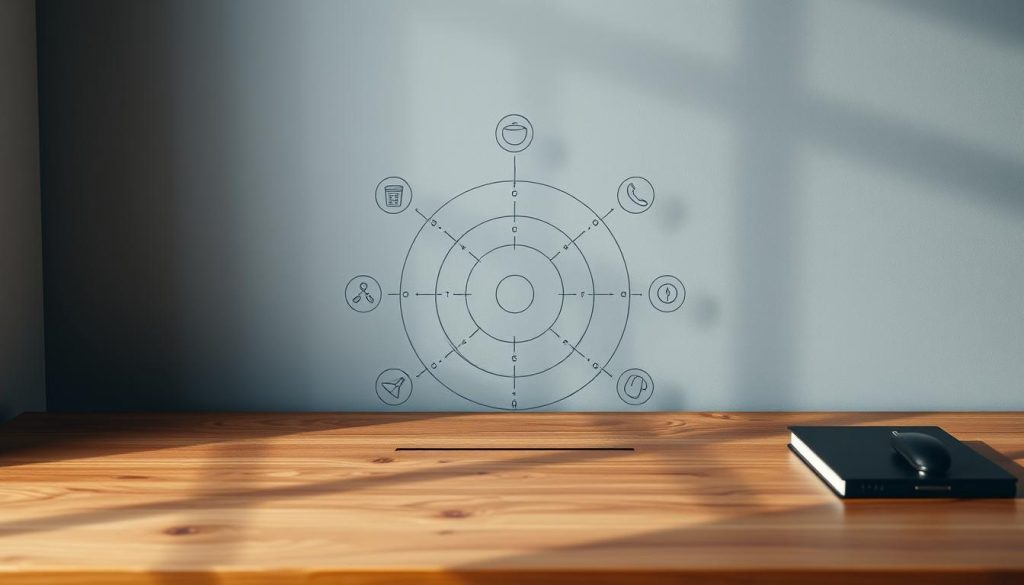Do you ever feel stuck in the same routine, wondering if there’s more to life? You’re not alone. Millions of people wake up each day feeling disconnected from their true potential.
The good news is that transformation starts with a single decision. Personal growth doesn’t happen overnight, but small changes can create powerful results. When you combine mental development with physical wellness, magic happens.
This journey isn’t about becoming perfect. It’s about making progress every day. Self-improvement and wellness work together to build a stronger, happier you.
Whether you’re taking your first steps or ready to go deeper, this guide offers practical tools. You’ll discover simple strategies that fit your busy life. Ready to unlock your inner strength and create lasting change?
Understanding Self-Improvement and Wellness
Understanding the mind, body, and spirit connection is key to personal growth. Self-improvement and wellness are partners on your journey to a better life. They work together, supporting each other every step of the way.
Real wellness is more than quick fixes. It’s about making lasting changes that improve your daily life. When you see this connection, you can make choices that benefit your whole self.

The Importance of Mental Health
Mental health is the foundation of your well-being. It influences every decision and relationship. Strong mental health helps you handle stress and think clearly.
Good mental health lets you recover from challenges faster. It also helps you focus on goals and maintain positive relationships. Taking care of your mental health is not selfish; it’s essential for a fulfilling life.
Mindfulness practices can greatly improve your mental health. Simple techniques like deep breathing or meditation help you stay present and manage emotions better.
The Role of Physical Fitness
Physical fitness does more than keep your body healthy. It boosts your mood, energy, and mental clarity. Regular exercise releases chemicals in your brain that make you happier and more alert.
You don’t need to become a fitness expert overnight. Start with activities you enjoy, like walking or dancing. The key is to be consistent, not intense.
Physical activity also improves sleep and stress management. When your body feels strong, your confidence grows. This makes you more likely to tackle other areas of self-improvement.
Balancing Emotional and Spiritual Well-Being
Emotional intelligence is crucial for your wellness journey. It helps you understand and manage your feelings. When you develop emotional intelligence, you communicate better and build stronger relationships.
Spiritual well-being doesn’t need specific religious beliefs. It’s about connecting with something bigger than yourself. This can happen through nature, community service, or personal reflection.
Finding balance between these areas takes time and practice. Start by noticing how different activities make you feel. Choose practices that help you feel centered and peaceful, then make them part of your routine.
Setting Realistic Goals for Personal Growth
Setting realistic goals turns vague dreams into real steps. Many find it hard to set goals that are both ambitious and achievable. The secret is to use proven methods and break big dreams into smaller steps.
Setting goals well needs structure, patience, and regular checks. With clear goals, you make a plan that guides your daily choices and long-term success.

SMART Goals Explained
The SMART framework helps make goals that last. It makes sure your goals are Specific, Measurable, Achievable, Relevant, and Time-bound. For example, instead of “I want to get healthier,” a SMART goal is “I will exercise for 30 minutes, four times a week for three months.”
Specific goals clear up confusion and give direction. Measurable parts let you track your progress. Achievable goals keep you motivated without feeling overwhelmed.
Relevant goals match your values and life situation. Time-bound goals add urgency and stop you from putting things off. Life coaches often suggest this because it turns dreams into doable plans.
Breaking Down Yearly Objectives
Big yearly goals can feel too much without breaking them down. Think of yearly goals as a staircase, with each month a step. Each week has the actions needed to move up toward your goals.
The 90-day sprint method is great for staying focused. You focus hard on certain areas for three months before checking your plan again. This keeps you moving forward without burning out.
Monthly goals keep you on track and motivated. Weekly tasks make big goals seem doable. Daily habits add up over time for big changes.
Evaluating Progress and Adjustments
Evaluating regularly isn’t about being too hard on yourself when you don’t meet goals. It’s about seeing what works and what doesn’t. Have weekly meetings to check your progress and find hurdles.
Being flexible but consistent is key to success. Sometimes, you need to change your goals because of outside factors. Being able to adapt shows wisdom, not weakness.
Keep track of both numbers and how you feel. Numbers tell part of the story, but your feelings and thoughts are just as important. Life coaching stresses the importance of this balanced view.
Remember, setbacks are part of growing. Use them as chances to learn, not as reasons to give up.
Building Healthy Habits for a Fulfilling Life
Creating lasting change is more than just wanting it. It takes building healthy habits that feel natural. These habits support your well-being in many ways. Over time, they lead to big changes in how you feel and live.
Wellness becomes easier when you know how to create systems that help you. Instead of relying on willpower, you can set up your environment and schedule to support good habits automatically.
The Power of Routine
Routines are key to personal growth because they save mental energy and lead to success. A consistent morning routine sets a positive tone for the day. Your brain prefers routine, making it easier to stick to good habits without constant effort.
Begin with small routines. Start with simple actions like drinking water or writing down three things you’re thankful for each morning. Once these become automatic, you can add more.
Focus on being consistent, not perfect. Even a short routine done daily is better than a big plan followed only sometimes.

Mindfulness Practices to Incorporate
Mindfulness makes you more aware and present, which is vital for healthy habits. You don’t need to meditate for hours to benefit. Just ten minutes of focusing on your breath each day can reduce stress and improve your mood.
Meditation can be as simple as enjoying your morning coffee fully or taking deep breaths before meetings. These small moments of mindfulness help you handle life’s challenges better.
Try mindful walking, focusing on each step and your surroundings. It’s great for busy days because it combines physical activity with mental clarity.
Nutrition’s Role in Wellness
Your diet affects how you feel and perform, making nutrition essential for wellness. Instead of strict diets, focus on eating whole foods, staying hydrated, and eating regular meals. This keeps your energy stable.
Small, consistent changes in your diet are more effective than big changes. Start by adding vegetables to meals or drinking water instead of sugary drinks.
Plan your meals to avoid making unhealthy choices. Having healthy options ready helps you make better choices, even when you’re busy or stressed.
Remember, sustainable nutrition is about making better choices most of the time. Enjoy life’s pleasures in moderation, too.
Overcoming Challenges on the Journey
Dealing with obstacles is key to lasting change. Your wellness journey will test your resolve. But, these challenges help strengthen your character and deepen your commitment to personal growth.
Success in self-improvement comes from how you handle difficulties. Learning to cope with challenges turns them into stepping stones towards your goals.
Dealing with Setbacks
Setbacks are learning experiences in disguise. When you miss a workout or eat unhealthy, don’t be too hard on yourself. Instead, be curious and compassionate.
Ask yourself what led to the setback. Maybe you stayed up late or ate due to stress. Understanding your triggers helps you prepare better for the future.
It’s important to get back on track quickly. One missed workout or unhealthy meal doesn’t ruin your goals. Focus on your next positive action.

Cultivating Resilience
Resilience grows with practice, like physical strength. Start by finding stress management techniques that fit your lifestyle. Try deep breathing, progressive muscle relaxation, or meditation to stay centered.
Building emotional intelligence helps you recognize your emotional patterns. Notice when you feel frustrated or anxious. This awareness lets you choose better responses.
Keep a list of activities that boost your mood. This could be listening to music, going for a walk, or calling a friend. Having these activities ready helps you bounce back faster.
Seeking Support from Community
Community support speeds up your progress and makes challenges easier. Join fitness groups, online forums, or local meetups. Surrounding yourself with like-minded people boosts motivation and offers advice.
Find an accountability partner with similar goals. Regular check-ins provide encouragement and help you stay on track. Knowing someone understands your struggles makes the journey less lonely.
Don’t hesitate to seek professional help when needed. Therapists, coaches, and counselors offer specialized guidance. Professional support can provide insights that speed up your growth journey.
Resources for Self-Improvement and Wellness
The right tools and resources are key to your wellness journey. They give you ongoing inspiration and practical advice. Whether you like reading, listening, or hands-on learning, there’s something for everyone.
Choosing the right resources saves time and helps you avoid common mistakes. They offer strategies from experts who have been where you are.
Recommended Books and Podcasts
Books are a great way to learn about personal development. They provide deep insights you can come back to anytime. Here are some must-reads for your library:
- “Atomic Habits” by James Clear for building lasting positive habits
- “The Power of Now” by Eckhart Tolle for mindfulness and spirituality practices
- “Emotional Intelligence” by Daniel Goleman for better emotional awareness
- “You Are a Badass” by Jen Sincero for confidence and motivation
Podcasts are great for learning on the go. Shows like “The Tim Ferriss Show” share insights from top performers. “On Purpose with Jay Shetty” focuses on spirituality and meaningful living.
Online Courses and Programs
Digital learning platforms offer more than just books. They have interactive elements and community support. Top platforms cover topics from meditation to goal setting:
- Coursera – University-level courses on psychology and wellness
- Udemy – Practical skills for stress management and productivity
- MasterClass – Expert-led classes on various life skills
- Mindvalley – Personal development and spirituality programs
Many platforms offer certificates of completion. This adds credibility to your learning. Life coaching programs provide personalized guidance and accountability for deeper change.
Local Workshops and Events
Learning in person offers unique opportunities for connection. Local events let you network with others in your community. They provide immediate feedback and support.
Check these venues for upcoming workshops and events:
- Community centers for personal development seminars
- Libraries for book clubs and discussion groups
- Yoga studios for mindfulness and wellness workshops
- Wellness centers for holistic health programs
Local life coaching groups and spirituality circles offer ongoing support. They provide shared learning experiences. These connections often become valuable long-term relationships that support your continued growth.
Celebrating Your Progress and Success
Your journey of self-improvement and wellness is worth celebrating at every step. Acknowledging your progress boosts positive habits and keeps you driven. Every small step is a big win in your life’s journey.
Reflecting on Achievements
Make it a habit to look back at your wins each week. Keep a journal to track your successes and challenges. This practice keeps you focused on your goals and shows how far you’ve come. It also builds your confidence for what’s ahead.
Sharing Your Journey with Others
Talking about your experiences can inspire those around you. You don’t have to share everything with everyone. Share your story in meaningful ways, like with friends or by mentoring someone. Sharing your journey helps you learn more and supports others facing similar hurdles.
Continuous Learning and Growth
Self-improvement and wellness are lifelong paths, not destinations. Always be open to new ideas and methods that fit your changing needs. Remember, what works today might change tomorrow, and that’s okay. Focus on growing and remember, it’s the journey, not perfection, that matters. Your dedication to personal growth will lead you to a life that reflects your values and dreams.

